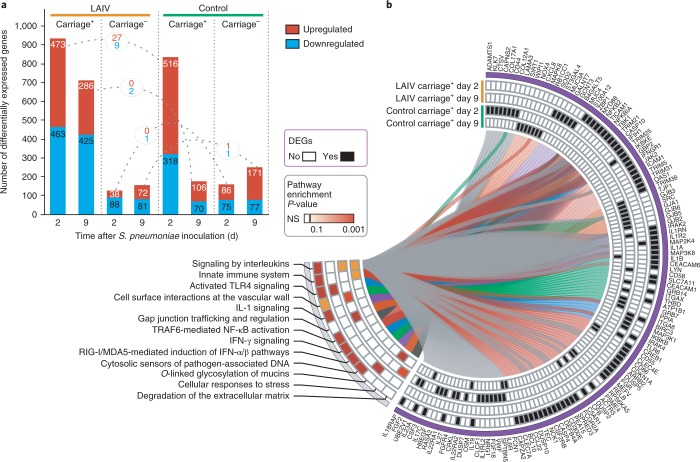Inflammation induced by influenza virus impairs human innate immune control of pneumococcus.
Colonization of the upper respiratory tract by pneumococcus is important both as a determinant of disease and for transmission into the population. The immunological mechanisms that contain pneumococcus during colonization are well studied in mice but remain unclear in humans. Loss of this control of pneumococcus following infection with influenza virus is associated with secondary bacterial pneumonia. We used a human challenge model with type 6B pneumococcus to show that acquisition of pneumococcus induced early degranulation of resident neutrophils and recruitment of monocytes to the nose. Monocyte function was associated with the clearance of pneumococcus. Prior nasal infection with live attenuated influenza virus induced inflammation, impaired innate immune function and altered genome-wide nasal gene responses to the carriage of pneumococcus. Levels of the cytokine CXCL10, promoted by viral infection, at the time pneumococcus was encountered were positively associated with bacterial load.
Authors
Simon P Jochems; Fernando Marcon; Beatriz F Carniel; Mark Holloway; Elena Mitsi; Emma Smith; Jenna F Gritzfeld; Carla Solórzano; Jesús Reiné; Sherin Pojar; Elissavet Nikolaou; Esther L German; Angie Hyder-Wright; Helen Hill; Caz Hales; Wouter A A de Steenhuijsen Piters; Debby Bogaert; Hugh Adler; Seher Zaidi; Victoria Connor; Stephen B Gordon; Jamie Rylance; Helder I Nakaya; Daniela M Ferreira
External link
Publication Year
Publication Journal
Associeted Project
Systems Immunology of Human Diseases
Lista de serviços
-
Is the gut microbiome key to modulating vaccine efficacy?Is the gut microbiome key to modulating vaccine efficacy?
-
Toxicogenomic and bioinformatics platforms to identify key molecular mechanisms of a curcumin-analogue DM-1 toxicity in melanoma cells.Toxicogenomic and bioinformatics platforms to identify key molecular mechanisms of a curcumin-analogue DM-1 toxicity in melanoma cells.

